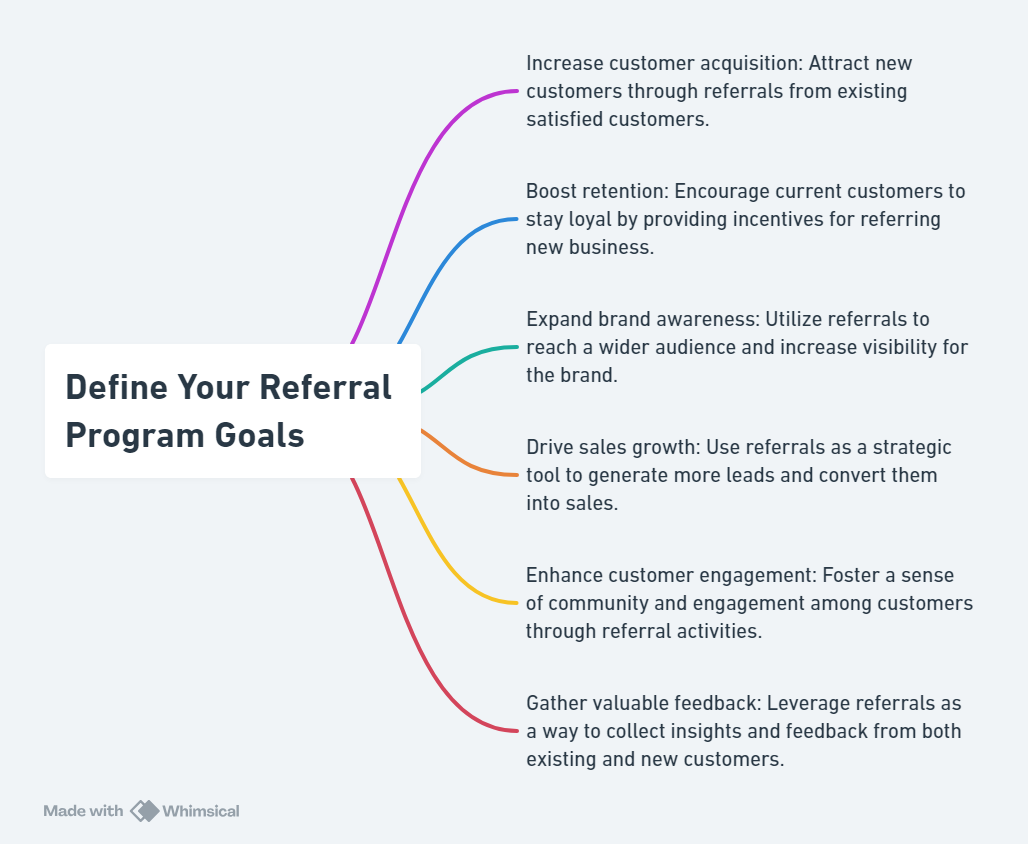Referral marketing is a powerful marketing strategy that can help businesses acquire new customers, increase sales, and build brand loyalty. By incentivizing existing customers to refer their friends and family, businesses can tap into a vast network of potential new leads. However, to be successful, it’s important to have a well-defined referral marketing plan in place.
Define Your Referral Program Goals

In the realm of referral marketing, success hinges on strategic planning and clear objectives. Before diving into the intricacies of execution, it’s paramount to define your referral marketing plan goals. This foundational step lays the groundwork for a targeted and effective approach to leveraging referrals for business growth.
1. Understanding the Importance of Goal Definition: Defining your referral marketing plan goals is akin to charting a course for your business’s growth trajectory. Without clear objectives, your efforts may lack direction and fail to yield optimal results. By delineating specific goals, you empower your team to focus their energies on activities that align with overarching business objectives.
2. Identifying Key Areas of Focus: When formulating your referral marketing plan goals, consider the various facets of your business that stand to benefit from referral initiatives. These may include customer acquisition, revenue generation, brand awareness, or even product expansion. By pinpointing the areas where referral marketing can make the most impact, you can tailor your strategies accordingly.
3. Defining Measurable Outcomes: A crucial aspect of setting referral marketing plan goals is ensuring they are measurable. Tangible metrics allow you to gauge the effectiveness of your efforts and make data-driven decisions moving forward. Whether it’s tracking the number of referrals generated, calculating the conversion rate, or assessing the lifetime value of referred customers, measurable outcomes provide valuable insights into your program’s performance.
4. Aligning Goals with Business Objectives: Your referral marketing plan goals should seamlessly integrate with broader business objectives. Whether your aim is to increase market share, enhance customer loyalty, or drive revenue growth, your referral initiatives should be designed to support these overarching goals. By aligning your efforts, you ensure that every referral generated contributes meaningfully to your business’s success.
Boost Your Brand: Referral Marketing Agencies Strategies in 2024
Create a Compelling Referral Incentive

A referral marketing plan is only as good as the incentive it offers. After all, what’s going to motivate your customers to refer their friends and family to your business? The answer is simple: a compelling referral incentive.
Your referral incentive should be something that is valuable to your customers and that they are willing to share with their friends and family. It could be a discount, a gift, or a cash reward. The key is to make the incentive valuable enough to encourage people to take action.
Here are a few tips for creating a compelling referral incentive:
- Make it relevant to your target audience. What would your customers be most interested in receiving as a referral incentive? Consider their demographics, interests, and needs.
- Make it easy to redeem. The easier it is for customers to redeem their referral incentive, the more likely they are to do so. Make sure the redemption process is clear and simple.
- Promote your referral incentive. Once you have created a compelling referral incentive, be sure to promote it to your customers. Let them know about the incentive through email, social media, and your website.
By following these tips, you can create a referral incentive that will help you achieve your referral marketing goals.
Here are a few examples of compelling referral incentives:
- A discount on the customer’s next purchase
- A free gift with the customer’s next purchase
- A cash reward for each referral that converts into a customer
- A points-based system that rewards customers for referrals
- A VIP membership program for customers who refer a certain number of people
The best referral incentive for your business will depend on your specific goals and target audience. However, by following the tips above, you can create an incentive that is both compelling and effective.
Boost Your Brand with Online Referral Marketing in 2024
Promote your Referral Program Effectively

A well-crafted referral marketing plan holds immense potential for business growth, but its success hinges on effective promotion. Promoting your referral marketing plan effectively is essential to maximizing its impact and driving meaningful results. In this guide, we’ll explore strategies to elevate your referral program’s visibility and engagement, ensuring its success in the competitive landscape.
1. Crafting Compelling Messaging: Central to promoting your referral marketing plan effectively is crafting compelling messaging that resonates with your audience. Clearly communicate the benefits of participation, highlighting the value proposition for both referrers and their networks. Utilize persuasive language and captivating visuals to capture attention and inspire action, driving interest in your referral program.
2. Leveraging Multi-Channel Promotion: To reach a wide and diverse audience, leverage multi-channel promotion tactics to amplify the reach of your referral marketing plan. Utilize social media platforms, email marketing, website banners, and in-app notifications to spread awareness and encourage participation. By diversifying your promotional efforts across various channels, you maximize exposure and engagement with your referral program.
3. Incentivizing Referral Participation: Incentives play a pivotal role in promoting your referral marketing plan effectively. Offer enticing rewards or incentives to both referrers and referees, motivating them to actively participate in your program. Whether it’s discounts, exclusive offers, or loyalty points, align incentives with your target audience’s preferences and interests to drive maximum engagement and referrals.
4. Cultivating a Culture of Advocacy: Beyond traditional promotional tactics, cultivate a culture of advocacy within your existing customer base to promote your referral marketing plan organically. Encourage satisfied customers to share their positive experiences and refer others through word-of-mouth recommendations. Foster a sense of community and belonging, empowering customers to become brand ambassadors who actively promote your referral program.
Maximizing ROI with B2B Referral Marketing Strategies
Track and Measure Referral Success

The final step in creating a successful referral marketing plan is to track and measure its success. This will help you determine what’s working and what’s not, so you can make adjustments as needed.
There are a number of metrics you can track to measure the success of your referral marketing plan, including:
- Number of referrals: This is the number of people who have been referred to your business through your referral program.
- Conversion rate: This is the percentage of referrals who convert into customers.
- Customer lifetime value: This is the amount of revenue that a referred customer generates over their lifetime.
You can track these metrics using a variety of tools, including Google Analytics, Salesforce, and HubSpot. Once you have collected data on these metrics, you can use it to improve your referral marketing plan.
For example, if you find that your conversion rate is low, you could try offering a more compelling referral incentive. Or, if you find that your customer lifetime value is high, you could focus on acquiring more referrals from your existing customers.
By tracking and measuring the success of your referral marketing plan, you can ensure that it’s meeting your goals and make adjustments as needed.
Here are a few tips for tracking and measuring referral success:
- Use a referral tracking tool. There are a number of tools available that can help you track the success of your referral marketing plan. These tools can track the number of referrals, the conversion rate, and the customer lifetime value.
- Set up goals for your referral program. Before you launch your referral program, set up goals for what you want to achieve. This could be a certain number of referrals, a certain conversion rate, or a certain customer lifetime value.
- Track your progress regularly. Once you have launched your referral program, track your progress regularly. This will help you identify any areas that need improvement.
By following these tips, you can track and measure the success of your referral marketing plan and make adjustments as needed to ensure that it’s meeting your goals.
Top 10 Referral Marketing Books for 2024
Conclusion on referral marketing plan

